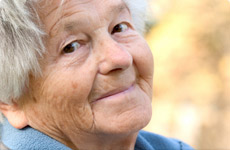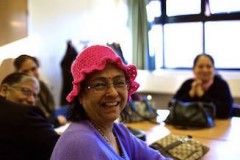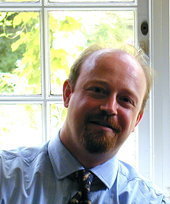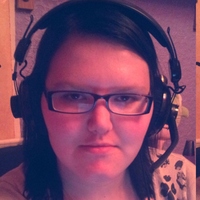 Two years ago, WaveLength supplied three women’s centres with TVs, radios and DVD players. Since then, 730 people have used these resources to get them through traumatic periods of their lives. Now we’re asking for more donations to extend the project across the UK.
Two years ago, WaveLength supplied three women’s centres with TVs, radios and DVD players. Since then, 730 people have used these resources to get them through traumatic periods of their lives. Now we’re asking for more donations to extend the project across the UK.
Choosing what you want to watch on TV is a choice that most of us take for granted: but for people who’ve been encouraged to believe that they have no agency and no power over their own lives, it’s a big step towards independence and confidence. TVs, radios and DVD libraries in women’s centres helps women and children made homeless by abuse to stay in contact with the outside world, develop companionship through communal viewing, and enjoy the comfort of a regular family schedule. The donations also send a clear message: that domestic abuse is intolerable and wrong.
That’s why WaveLength donated equipment to three UK women’s centres – and that’s why we’re now asking donors to help us help more incredibly brave domestic violence victims across the UK to move forwards with their lives.
“Knowing that there is someone out there, giving TVs like that, to help mothers like me, meant the world” – Kelly, Liverpool, mother of three
Why Women’s Aid?
WaveLength constantly assesses changes in the social and economic landscape to provide contact, comfort and companionship for people who are lonely and vulnerable. The TVs and radios we supply can be a lifeline to beneficiaries who are elderly, disabled, suffering from chronic illness, or otherwise isolated, providing a vital link to the outside world.
In 2009, we launched a six-month trial project which diverges from our traditional model of donating TVs and radios to individuals. During that year, we received a number of applications for TVs from women’s refuges. We were being asked to help a whole community of extremely vulnerable people. Refuge workers told us that abusers often systematically isolate their victims from local communities, meaning that leaving their abusers to go to a women’s refuge is an enormously brave step. To build up new lives for themselves and their children, they need to feel welcomed and ‘at home’ in the centres.
Research showed us that well over 19,000 women lived full-time in refuges in 2009, as they struggled to start a new life away from abusive partners. Living with them were more than 21,000 children. The UK has around 1000 women’s refuges, but these are losing funding fast.
When Centre 56, a Liverpool refuge, invited WaveLength to come and see the work it does, we were excited to learn about the range of services provides including counselling, childcare, and access to social workers. Tragically, many of these facilities are being cut, under the pressure of local authority funding withdrawals.
With these financial pressures, it’s not surprising that the TV facilities within centres are often poor quality or non-existent. For instance, the TV donated to one centre by a local racecourse could only receive one channel. We were also surprised to learn that women’s aid centres are not supported by Digital UK’s Help Scheme, which helps those on low incomes to switchover to digital TV. WaveLength is proud to free up funds for these centres by providing vital support equipment.
TVs remind residents that they are part of a community, and gives a home-like atmosphere to refuges. While watching TV, residents terrorised by domestic violence can reassert a structured family schedule, gain a window to the outside world, and socialise with one another and with their children.
Now, we’re asking for more donations and more awareness to create a long-term equipment funding programme for women’s centres across the UK. Please read on for more information.
“By making this donation the Charity is not just trying to offer practical help but is adding its voice to condemn domestic violence in whatever form. I personally believe we all have to say that such crimes are not acceptable and by keeping quiet we add to the problems.” – Tim Leech, WaveLength CEO
How Do We Help?
Our trial project supplied three women’s aid centres – Torfaen Women’s Aid Centre, Centre 56, Liverpool, and Wrexham Women’s Aid Centre – with some combination of:
- 19” wall-mounted digital TVs for individual rooms
- large-screen wall-mounted digital TVs for communal areas
- DVD players, radios and radio cassette players
- a small DVD library
We were proud to help 278 women and children during the first six months of the project. In the three years since then, our TVs, radios and DVD libraries have supported around 730 people passing through the centres as they move forward from a traumatic situation and into independence. These are fantastic figures, and incidentally show that this project helped more people, with less money, than our usual method of donating to individuals.
However, cost benefit is secondary to the importance of helping women and children to feel safe, secure and in contact with their communities at a diffcult time in their lives. WaveLength was thrilled to hear feedback from staff and residents.
Kelly, a mother of two, fled her violent partner and entered a Liverpool hostel while pregnant with a third child:
“Leaving our home and going to a refuge was really scary. I was petrified that there would be fights and that the refuge would be full of drunks. Going to Centre 56 was brilliant though. The boys settled in really easily, having the TV made it a real home for them. I can’t tell you what bliss it was to have the kids settled, just heaven. Once the kids were asleep I could watch films to help me unwind, or sometimes Eastenders on the later repeats.
“Sometimes in the day, the kids would watch CBBC in the main lounge with the other kids. It was good for them to play with the other kids and it meant that I could get on with jobs like the washing and cleaning our room, it was a big, big help.”
Other residents told us that:
“Having a TV in my room allows me my own space and lets me watch what I want. When you’re lonely or when you need time to yourself the TV is company.”
“Staying in a refuge can be difficult at times – sometimes you want to mix sometimes you want to be alone, but this can also be isolating. I cannot imagine living here without the company of the TV you have provided. Thank you.”
“I think it would be difficult at bedtime with my little boy as the TV settles him before he goes to sleep.”
Refuge staff reinforce what these women say: the TVs provide an element of distraction and reassurance to hectic lives, and make centres seem home-like and welcoming.
In addition, refuge staff tell WaveLength that our equipment serves many other more specific needs. For example:
- Installed in interview rooms, TVs and radios relax women and children as they speak with social workers and police.
- TVs give the opportunity for positive parenting lessonsduring communal activities such as family film nights.
- One centre told WaveLength that watching the 2010 World Cup live indulged a family pastime without accompanying family violence, helping young people to break the cycle of domestic abuse.
In addition, WaveLength supported the refuges in approaching other funders, including joint press releases and our database of contacts. This added support helped two refuges to refurbish out-of-date facilities.
What Next?
The trial project was extremely successful, and just three years later, the TVs, radios and DVD players we installed have helped 730 vulnerable people move forward through a transitional phase in their lives.
We’re proud to support women’s centres’ aim of creating a hospitable and supportive first step towards a full independent life. When we improve people’s social, cultural and information links, we help them to move forwards without becoming reliant on support. Everybody at WaveLength is passionate about meeting this need.
In addition, this project raises awareness of the vital services which women’s centres provide, in a climate where many centres lose funding. Here are some statistics:
- Just 60% of people appealing to the state for help escaping a violent partner found shelter in refuges in 2009.
- Centres run by the UK’s largest umbrella organisation for domestic violence victims, Women’s Aid, turn away 230 desperate women every day.
- Smaller centres which receive less than £20,000 in total funding (often those serving ethnic minority victims of domestic violence) have had 70% of that funding cut since 2010.
- As local authorities across the UK have cut an average of 40% of funding to centres since 2009, workers are struggling to keep beds available.
One of the beneficiaries of our trial project, Centre 56 in Liverpool, is struggling desperately to stay open after losing all of its funding from Liverpool Council. In Liverpool, domestic violence is behind one in four visits to hospital by women, is the main cause ofhomelessness, and affects by half of all children in care. This situation is unacceptable. Donating to these struggling centres supports one of WaveLength’s core focusses: representing and amplifying the voices of those whose isolation makes it hard for them to speak out for themselves.
Practically, receiving our free equipment can have a real impact on stark facilities. We want to take advantage of the UK’s digital switchover to help women in these centres to maintain links with their communities through the improved digital services now available.
WaveLength wants to find enough funding to support a long-term scheme extended to many more women’s centres across the UK. If we reach our goal, we’ll help these amazing places free up money to keep beds and staff available.
That’s why we’re now calling for more donations, more support, and more awareness-raising. Please help us reach our goal of providing much-needed companionship, comfort and contact tools to women and children fleeing abuse.


 Carers get their 15 minutes of fame on our social media channels
Carers get their 15 minutes of fame on our social media channels Many popular websites fail to cater for disabled people’s access needs. Our CEO, Tim Leech, puts this problem in perspective as a dyslexic web user.
Many popular websites fail to cater for disabled people’s access needs. Our CEO, Tim Leech, puts this problem in perspective as a dyslexic web user. Emma: I love what you do I think its amazing and so sweet. It’s something you don’t really think about. It’s great that you help out those who are lonely or isolated by reconnecting them with the world.’
Emma: I love what you do I think its amazing and so sweet. It’s something you don’t really think about. It’s great that you help out those who are lonely or isolated by reconnecting them with the world.’ WaveLength has a new volunteer, James, who writes below why he decided to volunteer for us.
WaveLength has a new volunteer, James, who writes below why he decided to volunteer for us.